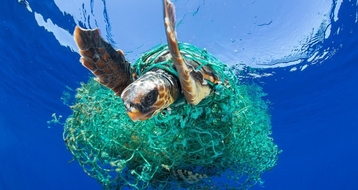
This World Ocean day on June 8th, Team PLAYBOX takes the pledge to keep our oceans clean.
Oceans and the life they sustain are vital to humankind. Unfortunately, overfishing, climate change, and pollution threaten these habitats.
The oceans are one connected body of salt water that covers more than 70 percent of the Earth, and we depend on these waters for human survival. They influence everything from the weather to the food supply to the health of seaside communities. Yet, we are the greatest offenders when it comes to pollution.
The oceans are also teeming with creatures that are critical to our ecosystems, yet all areas of the ocean are impacted by human activities. Lost or discarded nets, spilled oil and garbage, runoff, and sewage are all creating dead zones in the oceans. Excess carbon dioxide turns ocean waters acidic, and freshwater from melted glaciers will alter the weather-driving currents.
By 2050, there will be more plastic in the oceans than there are fish. We have put together a list of ways that can help you reduce your every day plastic pollution. This in turn will help save the future of our oceans.
Carbon Footprint
Be conscious of your energy use at home and work. Switch to compact fluorescent light bulbs, take the stairs, and avoid oversetting your thermostat.
Make Sustainable Seafood Choices
When you are grocery shopping or dining out, reduce the demand for overexploited species by choosing sustainably sourced seafood.
Use Less Plastic
Plastics kill tens of thousands of marine animals every year. Carry a reusable water bottle, use cloth totes for shopping, and always recycle whenever possible.
Help Care for the Beach
Always clean up after yourself and participate in a beach cleanup. Explore the ocean but don’t interfere with wildlife or remove rocks and coral.
Don’t Buy Items that Exploit Marine Life
Avoid buying items like coral jewelry, tortoiseshell hair accessories, and shark products.
Be an Ocean Friendly Pet Owner
Read pet food labels and consider seafood sustainability when choosing food for your pet. Don’t stock your aquarium with wild-caught saltwater fish, and never release aquarium fish into natural bodies of water.
Support Organizations that Protect the Ocean
Consider giving financial support or offering your time at volunteering.
Be the Change in Your Community
Research the ocean conservation positions of public officials before voting. Patronize restaurants and markets that offer only sustainable seafood.
Be Responsible when Traveling the Ocean
Practice responsible kayaking, boating, kayaking, and other activities on the water. Don’t ever litter and be aware of marine life in the water.
Educate Yourself About Oceans and Marine Life
The more you learn about this critical system, the more you can share that knowledge to educate others.
What Else Can We Do To Help?
The threats to our ocean ecosystems seem overwhelming. The oceans experience pollution, overfishing, climate change, and other issues. How can we make a difference as individuals? We can make a big difference starting here:
Connect
Learn about the ocean and how you impact the ecosystem. Read about conservancy and restoration – and then share what you have learned.
Be Water Wise
Reduce your family’s use of chemicals. Use fertilizer minimally, buy organic fruits and veggies, and choose non-toxic cleaning products.
Trim Down Trash
Trash doesn’t disappear. Moving water can carry loose trash to the ocean.
Don’t Live a Disposable Lifestyle
Invest in reusable bags, beverage cups, and non-plastic containers. Always recycle.
Litter Patrol
Never litter and be a part of the solution by participating in beach cleanups.
Be Fish Friendly
Only buy products that you can guarantee were sustainably harvested. Demand sustainable seafood at the grocery store and in at favorite dining spots.
Conclusion
On this little blue planet, we are but one species and we are the most dangerous to all the others. Our oceans and sea life are not replaceable. We can and must do our part to clean, conserve, and improve the conditions in our planet’s oceans.
Without the oceans, we put our lives in jeopardy. Let’s do the smart thing and take care of our oceans.
credits : connectforwater.org | https://www.top5.com/reducing-plastic-waste